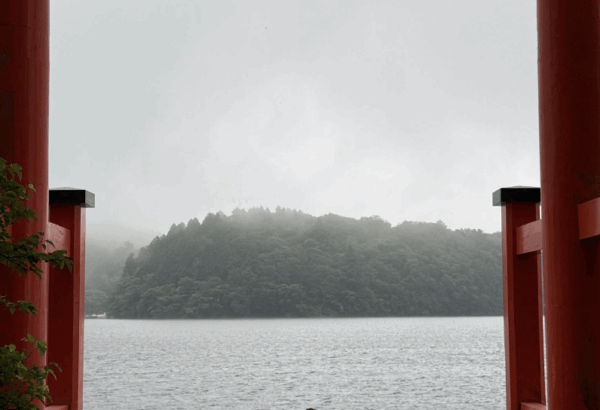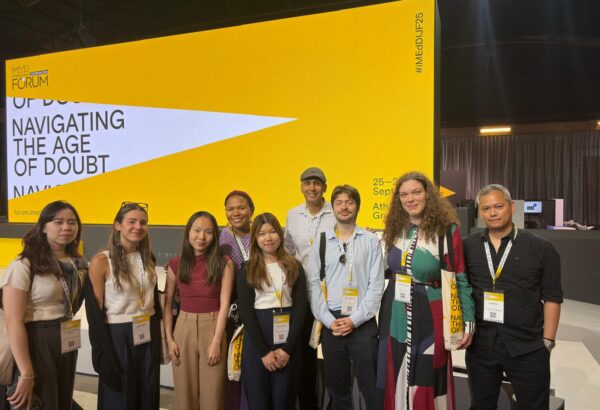In December 2022, Margarita Sianou, the Director of International Relations & Donor Development at the We Need Books (WNB) Library in Athens, Greece left me a voicemail asking the question about the role of libraries in supporting community health. She was referred to me by the Free Library of Philadelphia. I called her back to discuss community health programming ideas that libraries can implement. She started discussing how WNB Library is Greece’s only multilingual library and is supporting a growing multicultural and multilingual population of refugees, migrants, expats, and immigrants alongside working-class Greek people.
What neither of us was expecting to hear was that one of the cofounders of WNB Library had a similar experience as a youth migrant from South Asia ending up in Athens as my dad. There was a silence on the other end, when I shared that my dad, originally from rural Punjab, lived in Omonoia Square back in his youth and that I grew up listening to his stories about working on the ships. After the call, I referred to this as my Christmas miracle phone call to several people around this time of year. Thrilled at this newly found connection, I couldn’t wait to share this with my dad about this newer library that opened near his old neighborhood.
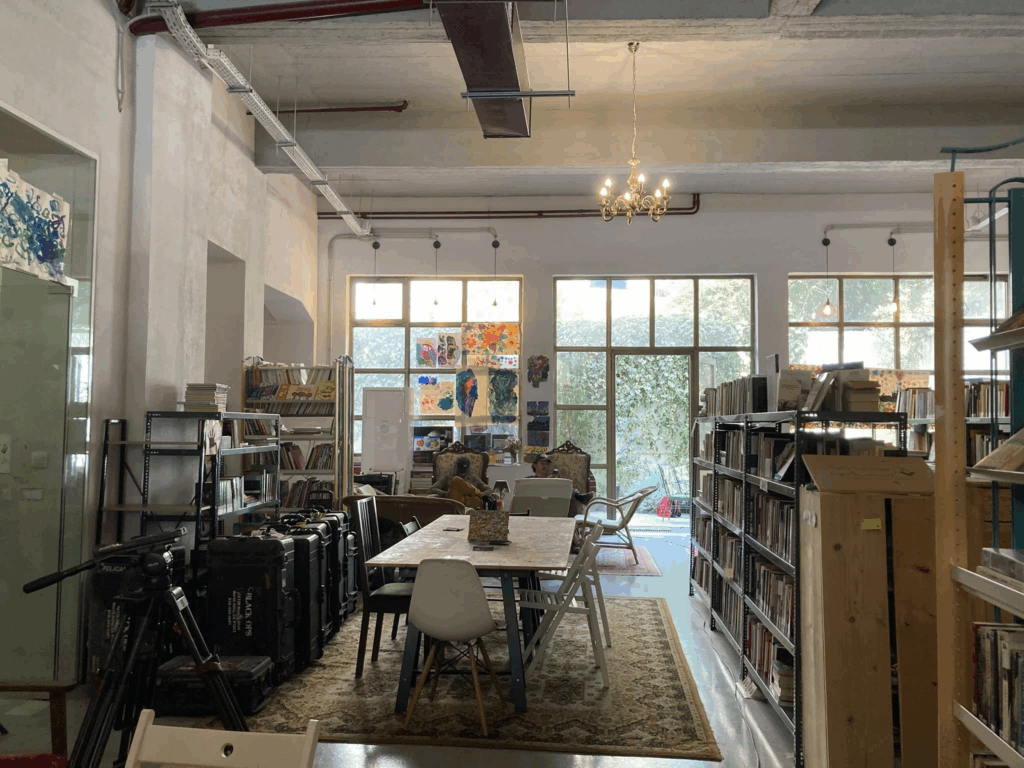
My dad learned the language, mastered the cuisine, and met lifelong friends in this era of his life. My brother and I listened to his stories, where he would talk about his life in Athens, out at sea, and his experiences in other countries on 4 continents, where the ship docked. This was how we learned about geography and some historical events as kids.
After winter break, Margarita and I had a few video calls and stayed in touch via email sharing resources about how libraries in Philadelphia, New York, Florida, and beyond support community health and wellness information needs to their communities. She had asked me if I was going to an upcoming SNF conference in Athens. I wasn’t, but reached out to the Penn SNF Paideia Program staff to inquire about it. They were planning to go to this conference with their students. Now, every year, more Penn faculty, staff, and students partner with the We Need Books Library by donating books and identifying potential collaborators and funders.
Around the same time, I reached a point as a Master of Public Health (MPH) student that I became eligible to propose a community-engaged fieldwork project (now called Applied Practical Experience (APE)). This is a requirement for every MPH student. In Spring 2024, the MPH program approved my proposal to help the WNB Library staff design and implement a community health learning needs and assets assessment to best understand how the library can support the health and wellness information needs of the multilingual and multicultural residents of Kypseli, the neighborhood in the City of Athens that the WNB Library is situated in. The assessment will lay the groundwork for the library’s future health section and strategic partnerships in community health.
My project focuses on addressing the role of libraries and community health and well-being, a question that many libraries have grappled with. In Summer 2024, I did an extensive literature review of how libraries around the world support health and wellness and talked to several Penn faculty and staff, including Dr. Kent Bream (Penn Medicine), Lynda Kellam (Penn Libraries), Dr. Fariha Khan (ASAM), and Dr. Fernando Chang-Muy (ASAM) on how best to approach this qualitative research project. Each scholar discussed their experiences on how they carefully think about how to build relationships, identify key stakeholders, and formulate questions to ask them. I also learned that qualitative research is time-consuming, particularly with the data analysis stage and that I needed to start thinking ahead about my codebook.
Last fall, with feedback from the WNB Library staff, I created a survey and conducted WhatsApp interviews to collect some initial stakeholder feedback. Dr. Sarah Ropp from the SNF Paideia Program introduced me to Sabirah Mahmud, a then-undergraduate SNF Paideia Fellow who has extensive qualitative research experience who provided Margarita and me guidance on how to approach the data analysis and the in-person interviews with cultural sensitivity.
In preparation for the in-person portion of my project, I saved up my vacation time and conversed with Dr. Katherine Cotter (Penn Positive Psychology Center), who had conducted a recent wellness survey at the New York Public Library – work that was in the Penn Today. Dr. Cotter’s study greatly informed me how I was going to shape my in-person interview questions and conduct observations. Subsequently, I enrolled in Dr. Justin Clapp’s PUBH 6040: Qualitative Research Methods in Public Health course in Spring 2025. Within Dr. Clapp’s course, I created an interview guide, an observation protocol, and an initial codebook that I took with me to Greece.
With the support of a Small Grant from the SNF Paideia Program, I was able to afford to stay in an AirBnB in the Kypseli neighborhood, so I was near the WNB Library, Kypseli Municipal Market, cafes, and parks, where I conducted in-person observations and stakeholder interviews with local clinicians, community leaders, volunteers, students, parents, other library visitors, taxi drivers, expats, migrants, adult children and grandchildren of immigrants, and more. This allowed me to further understand the geographic, cultural, and historical contexts of Kypseli.
Interestingly enough, during my first few days, The Fixers, a reality TV show known for renovating and building spaces for nonprofit organizations around the world, was at the WNB Library. Reality show crew members and local volunteers renovated the library’s basement to create a teen space and language lab that can also be used to host larger events. The episode, which I might appear in the background of, will air next month on BYUTV.
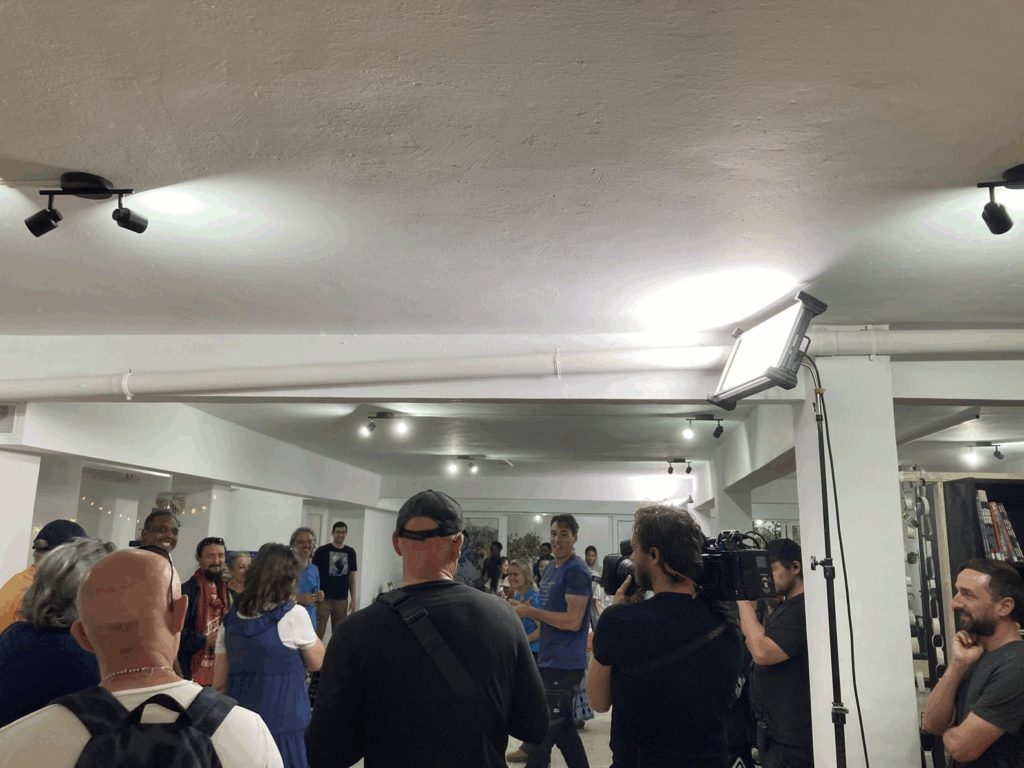
In between stakeholder interviews, I helped the WNB librarian sort books by language and age, weed the English fiction books, and we chatted about librarian things like what to do about too many old encyclopedias that people like donating to libraries, the differences in publishing across continents, and the dimensions of book shelves. One day, I alerted them that the preteen boys started to wrestle in the children’s section. These boys could not play sports outside loudly during the daily afternoon quiet time or siesta, so they came to the library. This instantly reminded me of my childhood. These quiet hours are observed between 2pm and 5pm – the hottest part of the day; in the Mediterranean, South Asia, and other regions that experience hotter temperatures, it can be quite essential to take a break indoors. At my childhood home in New Jersey, we also have quiet hours in the afternoons, where my brother and I had two options: take naps or do something quiet so my dad could get his nap.
Unlike libraries in the US, the WNB Library is only open a few days per week. When I wasn’t at the library, I spent time exploring the city. While Athens has famous historical sights and museums such as the Acropolis, the National Archaeological Museum, the National Botanical Gardens, and the Museum of Cycladic Art, I visited the University of Athens’ dental school library and the National Library of Greece to get a better understanding of the state of library culture in Greece, a common topic that came up in multiple stakeholder interviews. The Starvos Niarchos Foundation Cultural Center, another site I visited, houses the National Library of Greece, the Agora Dining Hall, the National Opera, and one of the largest parks in the City of Athens.
I continued conducting conversations and people were open to sharing their thoughts around health and wellness. Different types of wellness came up — sexual, mental, environmental, social, and financial. There were also personal reflections on how the positionality of our identities plays a role in who participates in community organizing and activism-related activities across Europe and beyond.
In between interviews I took time to walk through my dad’s old neighborhood and the seaport. I met a couple of my dad’s friends who told me about the changes that Athens had gone through since my dad left in the 1980s. While working on the ships is still common, Piraeus, where the seaport is located, is also very much developed. The suburbs of Athens are also more congested now than he would have remembered. New buildings were constructed for the 2004 Olympics. The wildfires have gotten worse. Unsurprisingly, some of these stories were mentioned to me by stakeholders for my project.
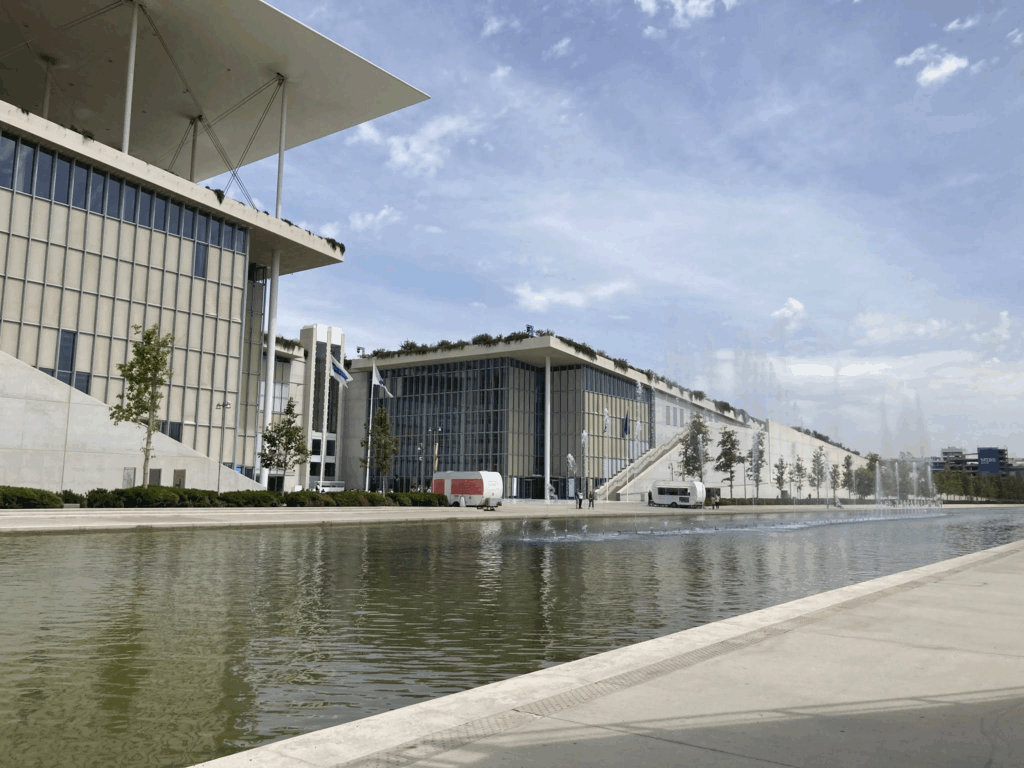
Outside of the city, I took a high-speed ferry to Aegina for a day trip. I also went on a drive through the Athenian Riviera to the Temple of Poseidon at Cape Sounio. During this drive, I learned about how dust rolling in from North Africa affects the air quality, which reminded me of how back in Philadelphia we also deal with smoke and other pollutants from wildfires and other situations near and far.
During my last in-person week at the We Need Books Library, Dr. Fariha Khan and Dr. Fernando Chang-Muy , who had previously helped with thinking about qualitative research, were also conducting interviews for their research project on the experiences of refugees and migrants in Greece. Some of the folks they interviewed were also stakeholders that I connected with previously.
During my last in-person week at the We Need Books Library, I took time to recenter myself with art. I took two classes at the Ioanna Art Studio. The first one was a silk scarf painting workshop. The scarf is my souvenir for my mom. The silk scarf depicts Athena’s (the goddess of wisdom), famous battle with Poseidon (the god of the sea). The second class was a watercolor painting lesson, where I learned how to paint the Acropolis. I also learned to weave my own custom evil eye at the Athens Living Museum, which uses theater to teach in an interactive style about how Athena cursed Arachne into weaving in the shadows as a spider for the rest of her life.
During my last day in Athens, I attended African SpringFest with new friends and stakeholders. This festival is an exemplar highlighting multiple generations of the multicultural community in Athens.
Since returning home, I plan to use Taguette, a free open-source qualitative data analysis software, to code and analyze the data I have collected. I am excited to share my report and recommendations with We Need Books Library. After I graduate next May, I hope to come back to Athens to continue volunteering at the library. This experience that began with a phone call one day, now seems to have been more than a coincidence. It has had a profound impact on me. I’m reminded of my dad’s older sisters back in rural Punjab who did not have the opportunity to learn to read during the Partition (the division of British India into the independent countries of India and Pakistan) and subsequent border conflicts, and here I am – a librarian pursuing a Master of Public Health degree.
Amanpreet “Aman” Kaur, CFCS, MLIS, a Master of Public Health student, anticipates graduating from the Perelman School of Medicine in 2026.



